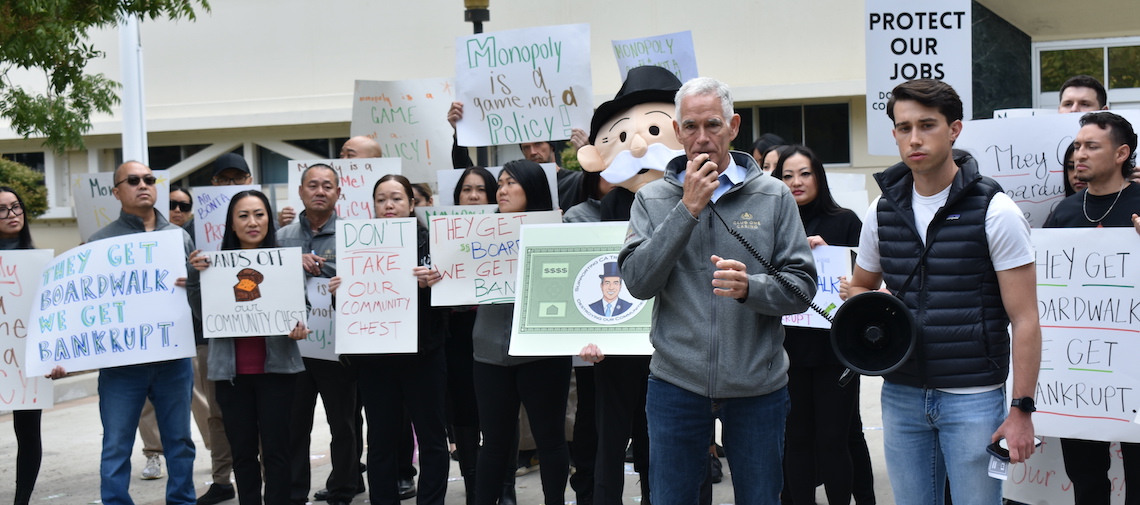
Kyle Kirkland, president of Club One Casino, speaks to the media during a card room regulation protest in Downtown Fresno on Thursday, Oct. 23. Photo by Frank Lopez
published on October 23, 2025 – 4:14 PM
Written by Frank Lopez
Cardroom workers and business and union leaders gathered near Fresno City Hall on Thursday, Oct. 23, to speak against proposed regulations that would ban blackjack-style games in California cardrooms.
Members of the American Federation of State, County and Municipal Employees (AFSCME) gathered outside Attorney General Rob Bonta’s Fresno office in the Mariposa Mall to protest his proposed regulations for cardrooms outside of tribal land.
California’s Department of Justice proposals would close loopholes that have allowed state-licensed cardrooms to offer blackjack-style games. Instead of “banked games” where bettors face the house, these games pit players against each other with the use of paid, third-property proposition player services.
Cardrooms like 500 Club in Clovis and Club One Casino in Fresno operate on this peer-to-peer system.
Tribal-owned casinos, including Table Mountain Casino Resort and Chuckchansi Gold Resort & Casino, are allowed to offer banked games.
According to the California Gaming Association (CGA), card rooms in Fresno County provide a total of 476 direct jobs, 139 indirect jobs, 149 induced jobs, $128.5 million in total economic impact and $500 million in statewide total taxes.
The approval of the proposed regulations would mean a loss of over 230 living wage jobs and millions in city funding, according to the CGA.
Kyle Kirkland, president of both Club One Casino and the CGA, said his cardroom contributes $1 million dollars to the city’s tax revenue each year.
Kirkland noted that there has not been a single private complaint regarding blackjack-style games other than by tribal-owned casinos.
“This is 100% politically driven. There is nothing that impacts the tribes in any meaningful way. We offer peer-to-peer gaming and blackjack-style gaming. They’re all approved,” Kirkland said. There is absolutely no reason whatsoever for the games now, all of a sudden, to be deemed illegal, unlawful, unsuitable for play.”
The Standard Regulatory Impact Assessment (SRIA) issued by Bonta’s office states that half of all players could stop visiting cardrooms under the new rules.
Kirkland said the impact will be worse. Loss of 50% of revenue would put Club One Casino out of business, he said.
“We’d have to radically rethink what we do and how we operate,” Kirkland said.
A group of tribes contend the 80 or so privately-owned gambling halls in California are illegally offering games such as blackjack, baccarat and pai gow poker, and by doing so, they’ve for years been stealing hundreds of millions of dollars of revenue from historically disenfranchised tribal communities across California, reported CalMatters. They have sued, but earlier this month a judge blocked their effort, saying federal gambling law supersedes state efforts to eliminate the games.
“It’s not about killing card rooms. It’s not about killing cities. It’s about protecting what’s ours,” Tuari Bigknife, the attorney general for the Viejas Band of Kumeyaay Indians, told CalMatters. His tribe operates a large casino in San Diego County.
Shavon Moore-Cage, past vice president of AFSCME Local 36 in Hawaiian Gardens, a Los Angeles casino, said the Covid-19 pandemic forced cardrooms to close, and they have barely survived.
They could not survive another hit like that, she said.
“Bonta’s proposed regulations are helping tribes to monopolize the California gaming industry, leaving our cities and our hardworking employees in the dust, and it’s just not right,” Moore-Cage said.
